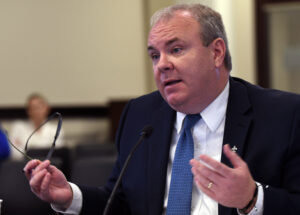(Getty Images)
FRANKFORT — Advocates for open government in Kentucky urged lawmakers Thursday to close anti-transparency loopholes in a bill that Republicans voted out of committee.

Despite changes made by the sponsor, the measure still could encourage officials to hide public business on private electronic devices, a Democratic lawmaker and a lawyer for the Kentucky Press Association warned.?
Rep. John Hodgson, R-Fisherville, made a few changes to House Bill 509 before it was heard in the House State Government Committee, but emphasized that while he supports open records, his concern is for “personal privacy” and modernizing Kentucky’s open records laws, which were established in the 1970s.?
“They’ve yielded good results over the years,” Hodgson said. “However, no one in the 1970s envisioned email and text messages and the like that have come to dominate a lot of our communications.”?
A dozen Republicans on the committee voted in favor of the bill, while four Democrats voted against it. Republican Reps. Savannah Maddox and Steve Rawlings passed.
According to a committee substitute version of the bill shared in a House GOP press release ahead of Thursday’s committee, Hogdson removed sections that would have redefined what a public record is.?
Last month, the representative publicly committed to making that change after hearing concerns raised by open records experts. The original draft would have blocked public access to government information that is available under the current law. Public agencies in Kentucky that are subject to open meetings and records laws include a range of organizations, from small local government and school boards to large public universities.
Hodgson had also promised the legislation would no longer try to shield personal cell phones and emails of state employees or board and commission members when used to conduct official business.

After it was filed, House Bill 509 drew criticism from open records advocates across the state. The Kentucky Press Association called the bill “an all-out assault on transparency.” First Amendment lawyer Michael Abate, who represents Kentucky news organizations and the press association, said on X, formerly Twitter, that the measure “would eviscerate access to public records in the Commonwealth” and noted it had support from House GOP leadership.?

Speaker David Osborne, of Prospect, and Majority Whip Jason Nemes, of Louisville, are co-sponsors of the bill.?
Abate, who represents the press association, told the committee that the changes made to the bill still leave a “loophole” that could allow officials to hide public business in private text messages and email.
The bill provides that a government employee or official using a private device for public business could be disciplined, but the bill does not expressly say those improper records should be disclosed under the law.
Abate predicted that some officials “determined to hide their communications” would intentionally deny the public access to government records by using private devices — “and say ‘ha ha, that’s not subject to open records anymore. Nobody can see that.’

If that’s allowed, Abate said, “the public will pay the price.”
“We’re grateful for the changes that have been made,” he said. “We’d like to see further changes made.”?
Abate pointed to requested communications among Jefferson County Public Schools officials during the busing debacle at the start of the school year. Those records on private devices, such as text messages, were of public interest, he said.?
Amye Bensenhaver, co-founder of the Kentucky Open Government Coalition, told the Kentucky Lantern the bill is a reaction to recent rulings by Kentucky courts that discussions of public business conducted on private devices are subject to the state’s open records law.
The Kentucky Court of Appeals sided with the coalition in October in a case against the Kentucky Department of Fish and Wildlife and issued an opinion that held messages on personal cell phones are public records when they are created or used by government officials for government business. The coalition had requested emails and text messages from current and former members of the commission in 2021.??
Bensenahver said HB 509 is an attempt to keep secret public records? on private devices.?

“It’s just an alternative way to achieve the same end, which is to eliminate the public’s right of access to communications by public officials or employees relating to public business that are conducted on a private device or email account,” she said. “That’s the goal.”?
?Hodgson said in the committee that his legislation was a direct result of that open records decision. He also said board members and public employees could be alarmed that their personal devices could be subject to an “open-ended fishing expedition” launched by a public request. However, both Behensaver and Abate said that’s not what happens when an open records request is made.?
Abate, who frequently litigates public records cases, said no one is asking for intrusive searches of personal devices. Typically, such records are disclosed by taking a screenshot of a responsive text message and turning that over.?
Bensenhaver, who is a retired Kentucky assistant attorney general who authored open records and open meetings decisions for 25 years, said the Court of Appeals’ October ruling doesn’t mean public officials must submit their entire phone to a search or all of the records on those devices are public. Additionally, some public records made on those private devices could be exempt under current exceptions anyway.?
Heather LeMire,? state director of Kentucky’s Americans for Prosperity chapter, said in a statement to the Kentucky Lantern the bill had undergone “significant changes since being filed that improves the intent of the legislation.”
“AFP-KY hopes this bill will continue to show legislators and citizens alike the importance of Open Records laws and government transparency, and we’re thankful for Rep. Hodgson’s leadership,” LeMire said.
Democrats on the committee voted against the bill. Rep. Tina Bojanowski, of Louisville, raised concerns that the bill would inadvertently encourage public officials to use private devices to shield public records from disclosure.?
“A public record is a public record, regardless of where it’s stored,” she said.?
The General Assembly passed a law in 2021 that shielded it from disclosing its records and made legislative leaders the final arbiter of decisions about disclosing legislative records. Democratic Gov. Andy Beshear issued a futile veto of the bill at the time.?
Beshear, a former attorney general, expressed support for House Bill 509’s requirement that government employees have a government email account and use it for all official business.
Editor’s note: This story has been updated with additional comments.?
]]>